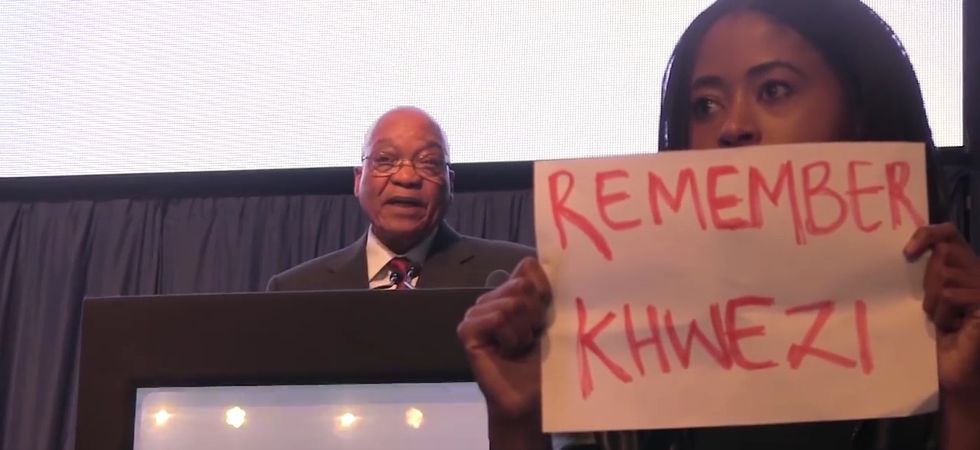The Story of Khwezi Is the Story of All South African Women Silenced by Patriarchy
Redi Tlhabi's new book on Kwezi is a real wake up call for all South Africans to finally address the perpetuation of rape culture.

The official major launch of journalist Redi Tlhabi's book, Khwezi: The Remarkable Story of Fezekile Ntsukela Kuzwayo, took place yesterday in Hyde Park, Johannesburg. South Africans came out in droves to show their overwhelming support, not only for the courageous journalist and her stirring work, but more so to commemorate the woman whose story has finally and wholly been told.
In 2005, Fezekile Ntsukela Kuzwayo or 'Khwezi' as she became known to the rest of the nation, accused then deputy-president Jacob Zuma of rape. The infamous rape trial that ensued concluded the following year with the judge ruling in favor of Zuma's version of events wherein he insisted that he and Khwezi had engaged in consensual (albeit unsafe) sex. Although Tlhabi's book makes use of information which was revealed during courtroom proceedings, it also unearths the very uncomfortable and intimate details which Zuma and his camp attempted to keep hush-hush during the trial itself. It speaks about the betrayal that Khwezi experienced at the hands of men she trusted, the likes of Zweli Mkhize, the current ANC treasurer-general who attempted to manipulate her into dropping the charges against Zuma. It speaks to how male privilege and power like a cocoon, protected Zuma as he told his side of the story whilst demanding that Khwezi not only prove that she had been raped but also account for how she'd had the audacity to be raped. The book goes on to detail her difficult journey after the trial ended, how South Africa vilified and ostracized her as well as her eventual death in October of 2016.
Hyde Park is shook! Too packed for words, books are flying off the tables like they're being given for free. Wow! 🙌🏾🇿🇦✊🏾#RediTlhabi #Khwezi pic.twitter.com/jaWqvrbKNV
— Rami Chuene 1st Lady (@ramichuene) September 27, 2017
Here at the launch of #Khwezi. Congratulations to Redi, but also we thank her for giving Fezi a voice. We are here to listen even to her 🙏🏿 pic.twitter.com/6WazGTvNHy
— IG: @MbuyiseniNdlozi (@MbuyiseniNdlozi) September 27, 2017
The timing of this book, could not have been more apt. This book comes during a turbulent time in our country where we are still not willing to reckon with the horrific reality under which too many South African women have been forced to survive. This book confronts our fervent denialism not only around our alarmingly high femicide rate but the 'corrective' rape that queer women experience but never receives the media attention it deserves. This year alone has elucidated the terrifying reality where raping a pregnant woman in front of her young son in a taxi or abusing and murdering a young woman has become commonplace and the only question our society will ask is how those women provoked their perpetrators such that they would commit those crimes.
In a society where rape culture has become the norm, where women cannot report the crimes committed against them because we are more concerned about not 'tarnishing' the good nature and character of the men who have perpetrated those crimes—this book is a reality check. It speaks to how the story of a single woman has given voice to thousands of other women who are forced either to carry the deadweight of their trauma on their backs daily or who have tragically gone to their graves because of it. This book is a mirror for a South Africa that failed its women back then and is still failing them today and how we cannot allow this to continue being the status quo.
A symbol of courage.https://t.co/kRR91Uqx1d#Khwezi#RediTlhabi pic.twitter.com/0qEKxOKi14
— Jonathan Ball Books (@JonathanBallPub) September 14, 2017
Most importantly, this book is an act of tremendous defiance. It is a huge middle finger to the powerful male figures in this country—not least our president—who feel they can violate women and walk away without so much as a slap on the wrist. This book points to how we will continue to shout on mountaintops the stories of those women who have and are suffering at the hands of toxic masculinity even long after those women cannot do so themselves.
I recall how those four brave female students, a few months before Khwezi passed away, stood with their placards as Zuma spoke at the election results announcement. Their passionate #RememberKhwezi protest fought to remind our nation that ten years later, justice had still not been served. As they were shoved out of the room by security guards, it felt as if their attempts had been somewhat futile and quickly forgotten. However, with the release of this book, I am certain that that will not be the case. It is a thorn in the sides of all who have fought to quash Khwezi's story over the years and will remain so until they have all claimed their stake in that injustice.
Every South African, especially our men, needs to read this book. We need to sit in its discomfort and its tragedy because that is what will eventually lead us to a place where we not only acknowledge but understand both the gravity and urgency with which we need to act.
Those of us not willing to do so, well, will continue to be a part of the problem.
Rufaro Samanga is an intellectual, aspiring literary great, feminist and most importantly, a fiercely passionate African.

